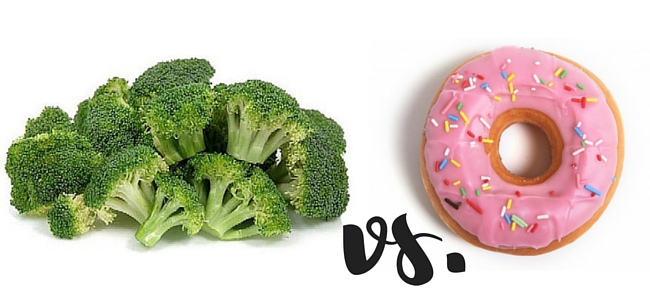Calories in and calories out, right? Well, sort of. But does 500 calories worth of donuts contain the same nutrients as 500 calories worth of broccoli? Not at all. What’s more important than the calorie count is the QUALITY of calories you are putting in to your body. On the latest Really, Truly Fit Podcast, Jim and Jess are discussing calories – t he good, the bad and the ugly.
Did you know that 67% of Americans report taking calories into account when making food purchases? But 9 out of 10 of those people don’t actually know how many they need?? That sounds a little crazy, right? You’re making all these efforts to count your calories but you don’t even know how many calories your body needs…for the goals you are trying to achieve. So let’s figure it out together using the Harris Benedict Formula!
So first, let’s determine your Basal Metabolic Rate (BMR):
Women: BMR = 655 + ( 4.35 x weight in pounds ) + ( 4.7 x height in inches ) – ( 4.7 x age in years )
Men: BMR = 66 + ( 6.23 x weight in pounds ) + ( 12.7 x height in inches ) – ( 6.8 x age in year )
Then, multiply your BMR by the appropriate activity level:
- If you are sedentary (little or no exercise) : BMR x 1.2
- If you are lightly active (light exercise/sports 1-3 days/week) : BMR x 1.375
- If you are moderatetely active (moderate exercise/sports 3-5 days/week) : BMR x 1.55
- If you are very active (hard exercise/sports 6-7 days a week) : = BMR x 1.725
- If you are extra active (very hard exercise/sports & physical job or 2x training) : = BMR x 1.9
The number calculated is the number of calories you need to MAINTAIN. If you want to GAIN body weight, you will need to consume an extra 500 calories per day which will equate to gaining about one pound per week. If you want to LOSE body fat, you will want to reduce your calories by at least 500, but not more than 1,000 below your maintenance level, but never, ever dropping below 1,200 calories per day for women or 1,800 per day for men.
So while it is important to have general knowledge on YOUR BODY’S needs, is it important to count calories? Yes and No. And here’s why:
PROS
- Calorie counting can help you weight your portion sizes
- Assists in keeping you accountable to yourself and others
- Helps you to realize just how energy dense poor food choices are
- Can help to motivate you to exercise so you can burn off those calories
- Assists in accurately creating calorie deficit
CONS
- Can lead to obsessive eating behaviors
- Can be misleading – may cause you to think that lower calorie is always better (it’s not!)
- Could mislead you into thinking high intensity exercise is better
- It’s tedious!
- It doesn’t take into account the hormonal response to certain food types – your body responds to each food differently. A calorie of protein does not affect your body the same way a calorie of carbohydrates does.
So, what are some healthy alternatives to calorie counting?
- Eat in smaller portions
- Measure your portion sizes. You can use this as a good reference for proper portion sizes.
- Eat a protein and carbohydrate at every meal and snack.
- Gauge your hunger – are you really hungry or perhaps you’re just “bored”.
- Work on your vices. Small changes can make a HUGE difference.
- Meet with a Registered Dietitian. Did you know that we now accept insurance for nutrition services? Those with plans through Optima, Anthem and Cigna are all covered at little to no cost.
Calories are important. We should definitely be aware of them but there are many other factors to be looking at as well. Focus on overall clean eating – lean proteins, vegetables and fruits, whole grains, and dairy and you’ll be well on your way to getting really, truly fit.

